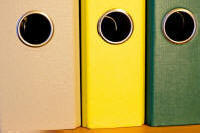Words
 |
Classes of words |
 |
Task 1:
Words come in different flavours. Try to classify the
words in red
in these sentences. Make a note of the name of the words class if you know it or what the word is doing (or both) and then click here for some comments. |
- The museum was on the corner.
- The man went to the museum.
- He drank some coffee.
- He walked around and he looked at nearly everything.
- He was exhausted.
- He sat down heavily on a bench.
- This bench was in a park.
- "Aaah," he said, feeling relieved.
- After a while, he went home.
- The museum was
on the corner.
This word tells us the relationship between the museum and the corner. Change it and you change the relationship (compare The museum was before the corner). It's a preposition. - The man went to the
museum.
This word represents a thing, a person or a place. We know in this case that there is only one museum in question but nouns like this can be plural. We can have, e.g., two museums, six men, a thousand pages etc. It's a countable or count noun. - He drank some
coffee.
This is another type of noun which represents a mass of something we don't usually count (like coffee, sugar, information etc.). It's called a mass noun. - He walked around
and he looked at nearly
everything.
This word connects two separate clauses which could stand alone. Change it and you change the connection (compare He walked around but he looked at nearly everything). It's a conjunction. - He was
exhausted.
This word describes a person, a place or a thing. It can be in a sentence like this after a verb like was or it can come before the noun (An exhausted man). It's an adjective. - He sat down
heavily on a bench.
This word tells us how he sat down. It's an adverb. - This
bench was in a park.
This tells us how to understand the bench. It's not just any bench. It's a determiner and there are lots such as the, that, seven, both, each etc. - "Aaah,"
he said, feeling relieved.
This actually doesn't mean very much and is just a noise. It's an interjection. - After a while,
he went home.
This word is linked to the man and stands in for it. We don't need to repeat the man everywhere. It's a pronoun.
 |
Task 2: To make sure you have understood all that, take a little test to check. |
 |
Relationships |
Words do not usually hang around on their own. They are seen in relationships with other words.
 |
Task 3:
Here are some examples. What is the relationship
between the word on the left and the word on the right? When you have a note, click here. |
| Word 1 | Word 2 | |
| a | The rain was... | ...torrential |
| b | Not torrential... | ...just a bit drizzly |
| c | big | small |
| d | enormous | huge |
| e | fire | conflagration |
| f | burn | burnable |
| g | polite | impoliteness |
| h | mother | child |
| Word 1 | Word 2 | ||
| a | The rain was... | ...torrential | Very few things in English can be described as torrential. We can't have, e.g., torrential waves. There is a natural affinity between certain words. This is called collocation. |
| b | Not torrential... | ...just a bit drizzly | Some words can be modified to make them stronger or weaker. Here a bit modifies and weakens the word drizzly. You can't do that with torrential. This shows that torrential is ungradable and drizzly is gradable |
| c | big | small | These are simple opposites. They are antonyms and their relationship is antonymy. |
| d | enormous | huge | These words often mean almost the same thing. They are synonyms and the relationship is synonymy. |
| e | fire | conflagration | These words also mean much the same thing but fire is more common (and covers a greater range) whereas conflagration is much more formal and rarer. The word fire is informal or neutral in style and has high frequency. The word conflagration is formal and has low frequency. |
| f | burn | burnable | The second word is an adjective formed from the verb burn. This is an example of word formation by adding a suffix. |
| g | polite | impoliteness | This is another example of word formation but in this case we have used a suffix (ness) to make a noun and then used a prefix (im) to make the antonym. |
| h | mother | child | You can't have one without the other. A mother automatically implies a child and a child automatically implies a mother. They are not antonyms, they are converse terms: one implies the existence of the other. |
 |
Task 4: To make sure you have understood all that, take a little test to check. |
 |
Meaning |
 |
Task 4:
What does 'book' mean? seems a simple enough question to
answer, doesn't it? Actually, there are some problems. Click here when you see some. |
- The police will book you if you do that again.
- Pass me that grammar book, will you?
- I need to book a room for tomorrow.
- I've lost my bank book.
- I've put your appointment in the book.
Problem 1
In these examples, we have two different classes of the word: we
have book as a verb in 1 and 3 and as a noun in the other
sentences.
Problem 2
The meaning of the verb is different (although just about related)
in sentences 1 and 3. In sentence 1. it means something like
charge and in sentence 3 it means reserve.
Problem 3
The meaning of all three nouns is slightly different and many
languages would use three different words for them. In
sentence 2, the reference is to a published volume, in sentence 4,
it refers to a record of transactions and in sentence 5, it refers
to some kind of diary.
What's the moral of the story?
Most words only mean something when they are placed in context. Without a context, we cannot know what is meant by any of the following:
| bank | money shop side of a river rely bet |
| table | propose an idea flat thing with legs chart list of figures |
| house | accommodate place for chickens home for humans completed bingo card |
You can invent your own examples, of course, but the fact is that most words in most languages can mean more than one thing.
What does mean actually mean?
There's an added complication.
To understand it, you need to learn the difference between two
terms:
- denotation
- this is what the base form of the word actually signifies. For example, a lamp is a thing for lighting (in fact, of course, quite a number of different kinds of light as we have seen above).
- connotation
- this is the emotional significance we attach to something. For example, a pig is a familiar farmyard animal but, in English, it can also be a derogatory term of insult.
Many words exhibit connotation as well as denotation.
Here's a very short list:
terrorist, partisan, freedom fighter, cop, glass ceiling, queer,
gay, sexy, fascist, dog, princess, bitch etc.
Not all of those words will have particularly strong connotations
for everyone, of course, and they certainly differ between
languages, but it is important to be aware of the existence of such
things.
 |
Learning more about words |
The tasks and information above have given you the basics and, if
you have done it all conscientiously, you are well placed to teach
vocabulary and help your learners.
There is, as you may imagine, rather a lot more to it than that.
The initial
plus training index has an entire section devoted to lexis (the
technical term for words) but, to start you off, here are a few
links to the simpler guides.
Web resources
You have already found a good one!
There are lots of websites intended to help people understand
English words. Many are wrong, many just lists of
interesting (or otherwise) facts and some are plain confusing.
Beware sites that give lists of quirky words just for fun. Your
learners are unlikely to need them.
There are lots of people out here who enjoy playing with words and
finding out useless facts about them. Such things are not a
resource teachers can use.
There are a number of vocabulary exercises and lessons for learners on this site. Click here to go to them.
